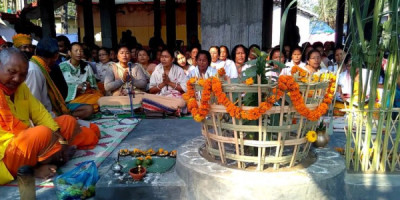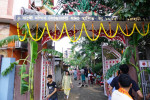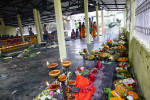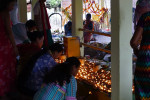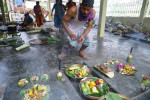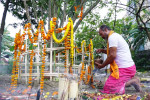History & Traditions
Bathow Puja – The Sacred Worship of Bathow Bwrai by the Bodo-Kachari Community of Assam
Origin and Meaning of Bathow Puja or Bathou Puja
The word “Bathow” comes from two Bodo words: “Ba” (meaning five) and “Thow” (meaning deep or profound), referring to the five natural elements — earth, air, fire, water, and sky — that are central to the Bodo faith. Followers of Bathowism believe that these elements sustain life and represent the divine essence of creation.
The Sijou Plant – Sacred Symbol of Bathow Bwrai
At the heart of every Bathow Puja lies the Sijou plant (Euphorbia splendens), revered as the living embodiment of Bathow Bwrai. The plant is planted in a sanctified spot, fenced with bamboo, and decorated with offerings such as rice beer, flowers, fruits, and betel leaves. This living altar symbolizes purity, life, and protection from evil forces.
Rituals and Offerings at Bathow Puja
Associated Deities and Spiritual Hierarchy at Bathow Puja
Bathow worship is not confined to one deity. The puja also honors other divine entities connected with Bathow, including:
-
Aileng – the guardian of Bathow, worshipped with fowl sacrifice and warrior dance.
-
Agrang – the commander deity, offered a goat.
-
Khouila – the messenger spirit.
-
Kazi – the minister deity.
-
Abla Khungur – a fierce form of Bathow, worshipped with rice beer and symbolic offerings.These deities represent the forces of nature and the cosmic guardianship that sustain life.
The Role of the Deodhani (Oracle Priestess) at Bathow Puja
A distinctive part of Bathow Puja is the Deodhani ritual, where a priestess enters a trance, believed to be possessed by Bathow’s spirit. Guided by the Dewri (chief priest), she performs sacred dances and delivers divine messages. This ritual expresses the deep connection between humans and the divine world.
Symbolism and Beliefs of Bathow Puja
In Bodo mythology, Khontha-Thawrai, a celestial being, created Bathow to protect and guide humanity. Bathow is considered the protector of skies, rivers, mountains, and human life. His presence in the Sijou plant reminds devotees of harmony between nature and spirituality. The religion of Bathowism blends animism, nature worship, and Hindu elements, symbolizing balance and coexistence.
Time and Celebration of Bathow Puja
Bathow Puja is observed mostly in January or February, though in some areas it is performed during July–August, depending on the agricultural calendar. The festival lasts for several days, involving community feasts, folk dances, and devotional songs. It is especially prominent in Kokrajhar, Udalguri, Baksa, Chirang and Tamulpur districts.
Cultural Significance of Bathow Puja
Beyond its spiritual dimension, Bathow Puja unites the Bodo community in prayer, celebration, and preservation of their ethnic identity. The rhythmic beats of the Kham (drum) and Siphung (flute), the chants of the Douri, and the sacred dances of the Doudini together create an atmosphere of divine devotion and joy.
Conclusion
The Bathow Puja is more than a religious ceremony — it is the soul of Bodo heritage and philosophy. It reflects a deep respect for the earth, a harmonious relationship with nature, and an unbroken bond between people and the divine. As Assam embraces its tribal traditions, Bathow Puja continues to illuminate the spiritual richness and cultural pride of the Bodo-Kachari community.
Bathow Puja Quick Info Table
| Category | Details |
|---|---|
| Festival Name | Bathow Puja / Bathou Puja |
| Celebrated By | Bodo-Kachari Community of Assam |
| Main Deity | Bathow Bwrai (Supreme God of the Bodos) |
| Symbol of Worship | Sijou Plant (Euphorbia splendens) |
| Key Rituals | Offerings, prayers, dances, Deodhani trance |
| Associated Deities | Aileng, Agrang, Khouila, Kazi, Abla Khungur |
| Type of Festival | Religious and cultural |
| Time of Celebration | January–February / July–August |
| Main Locations | Kokrajhar, Udalguri, Baksa, Chirang |
| Cultural Significance | Expression of Bodo faith, unity, and nature worship |
Bathow Puja FAQs
-
What is Bathow Puja?
Bathow Puja is a sacred festival of the Bodo-Kachari tribe of Assam, dedicated to Bathow Bwrai, their supreme deity. -
Who celebrates Bathow Puja?
The Bodo and Kachari communities of Assam celebrate Bathow Puja with devotion and traditional rituals. -
When is Bathow Puja celebrated?
It is mainly celebrated in January or February, sometimes during July–August, depending on local customs. -
Who is Bathow Bwrai?
Bathow Bwrai is the supreme god of the Bodos, often considered a folk form of Lord Shiva. -
What is the significance of the Sijou plant in Bathow Puja?
The Sijou plant symbolizes the living form of Bathow Bwrai and serves as the sacred altar during worship. -
What rituals are performed during Bathow Puja?
Rituals include offerings of rice beer, fruits, flowers, and in some traditions, animal sacrifices accompanied by chants and dances. -
What is the role of the Deodhani in Bathow Puja?
The Deodhani, or oracle priestess, performs divine dances and conveys spiritual messages believed to come from Bathow. -
Is Bathow Puja linked to Hinduism?
While rooted in tribal animism, Bathow Puja shares similarities with Shaivism and honors Lord Shiva in a folk form. -
Where is Bathow Puja most popular in Assam?
It is widely celebrated in Kokrajhar, Udalguri, Baksa, Chirang and other Bodo-dominated regions. -
What is Bathowism?
Bathowism is the indigenous religion of the Bodo people, based on the worship of Bathow Bwrai and the five natural elements.
